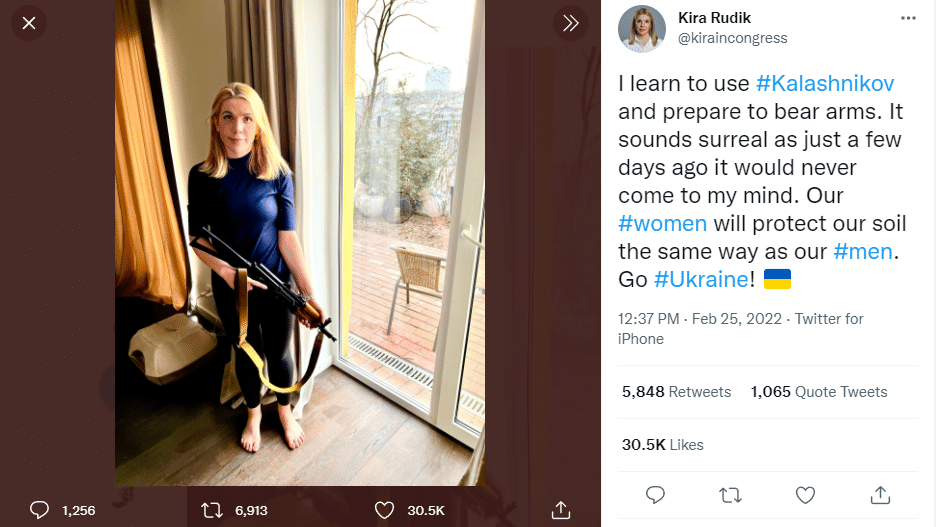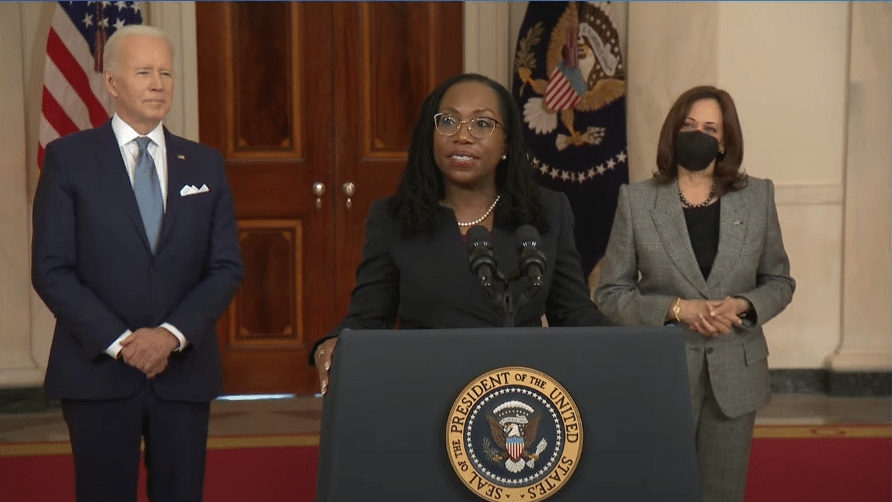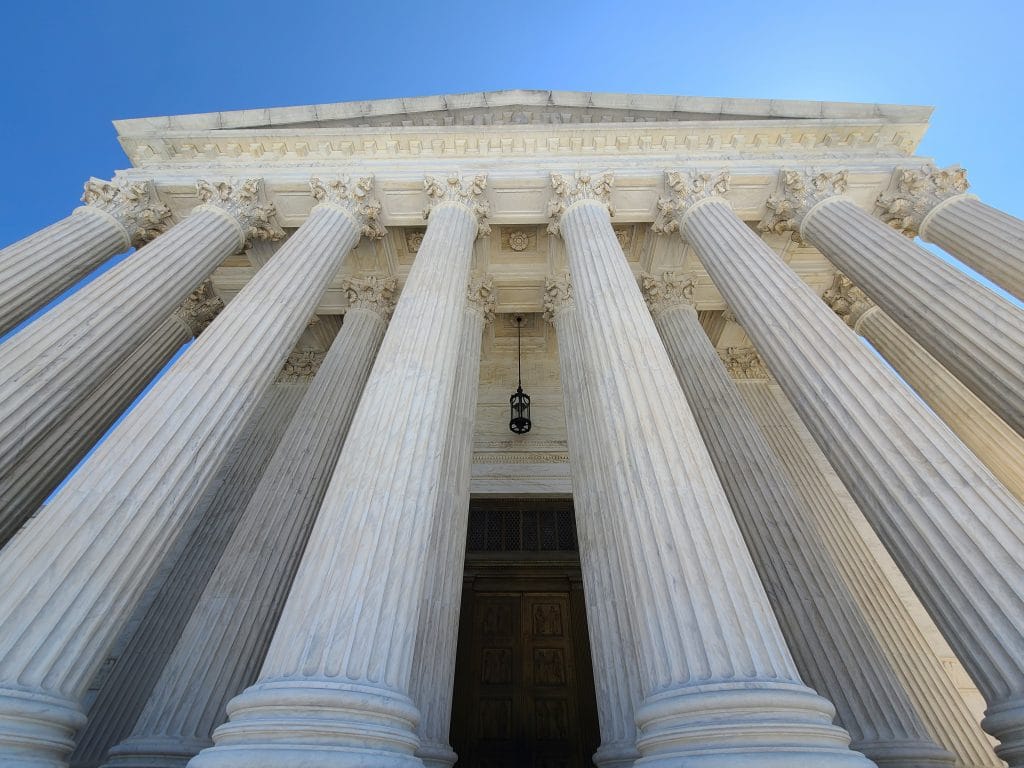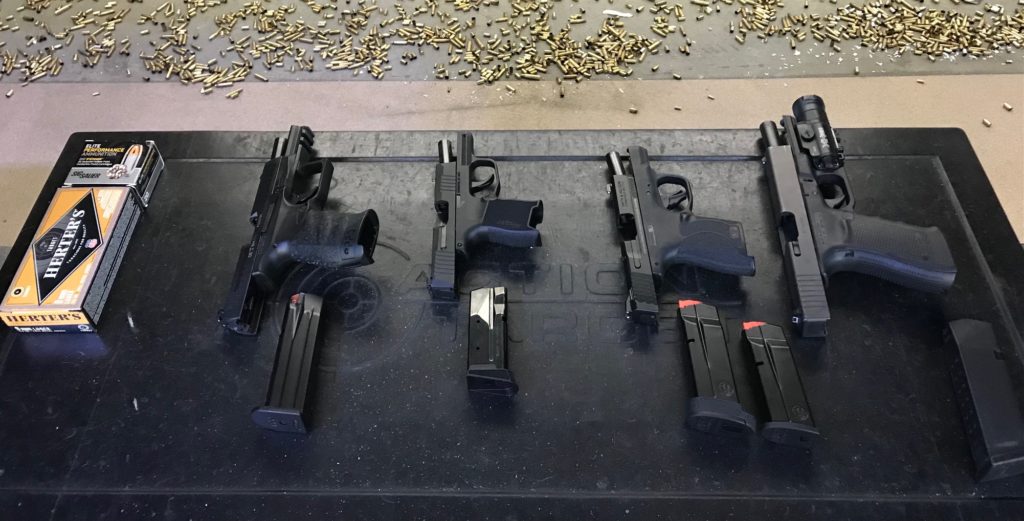Watching what Russia is doing to Ukraine is very difficult. The whole invasion is an act of evil that’s sure to result in an unforgivable amount of needless death. The Ukrainian resistance has been fierce and exceeded all expectations to this point which is the only point of light in this whole situation.
The Ukrainians have moved firmly in the direction of arming their populous to enable a greater level of opposition to the invaders. The resolve shown by civilian volunteers alongside the Ukrainian military indicates the takeover of the country will be extremely difficult or, perhaps, impossible even for the better-equipped Russians. Writer Anthony Constantini joins me on the podcast to dive deeper into the situation and how well-positioned Ukraine is to capitalize on its newly-armed population.
The Ukrainian invasion is not the only major news of the week, though. Back home we saw President Joe Biden (D.) announce his Supreme Court pick. She’s never issued a ruling in a Second Amendment case, but that doesn’t mean there’s nothing to glean from her record. I take a closer look at how she may treat gun cases on the High Court.
Plus, Contributing Writer Jake Fogleman looks at the newly-reignited fight over state preemption laws.
Podcast: Anthony Constantini On Ukraine Recognizing Civilian Gun Rights as Russia Invades [Member Early Access]
By Stephen Gutowski
War continues to rage in Ukraine as Russia attempts to capture cities across the nation despite fierce resistance.
Part of that resistance has been made up of civilian volunteers who’ve gained new protections for their right to armed defense and been given guns by the military. Anthony Constantini, who received a master’s degree in arms control and strategic studies from St. Petersburg State University, joined me on the show to discuss how this strategy of arming civilians represents a departure from traditional European views. And we talk about how it may play out.
Anthony wrote an analysis piece for The Reload on how this shift towards civilian gun rights may impact the entire region’s attitudes. The situation strikes at the heart of what many gun-rights advocates in America have long believed: an armed populace is harder to oppress.
But the reality is the fight will be brutal and could last for a long time. Arming the public, especially when done just as an invasion begins, is not a magic silver bullet that guarantees an easy win. There is no reason to envy the position Ukrainians are in right now, but they’ve given us many reasons to admire them.
Ukraine is unique and better positioned to employ volunteer civilian fighters than many in the west may realize, though. Anthony pointed out the country has been fighting a war with Russian-backed separatists for the past 8 years and volunteers have played a major role. Plus, the government has been actively training those volunteer groups and incorporating them into the military for a good while now.
The situation is moving quickly and there is no way to know how things will turn out. However, it appears the Russian invasion has not met its main goal of capturing the country’s major cities and deposing its government. We don’t know for sure how much the armed population is bolstering the country’s military operations, but everything we’ve heard from the Ukrainian people thus far indicates they have the kind of resolve that will make it extremely difficult to keep them under Putin’s heel.
You can listen to the show on your favorite podcasting app or by clicking here.
You can also watch the video podcast on our YouTube channel.

Member of Ukrainian Parliament Takes Up Arms Against Russian Invasion as Volunteers Rush to the Fight
By Stephen Gutowski
A member of the Ukrainian Parliament and leader of one of its political parties announced she is volunteering to take up arms against the Russian invasion on Friday.
Kira Rudik posted a picture of herself holding an AKS-74U rifle and declaring her willingness to fight. She said she’d started training with the gun, but the situation felt “surreal as just a few days ago it would never come to my mind.” She also said she is fully willing to use the gun if forced to do so.
“Yea, I will be willing to shoot and kill someone in defense of my family, and my city, and what I possess, and the land that we all love,” Rudik told the BBC. “I don’t understand why the Russians come to our country. I don’t understand why it’s fair for them to get in and try to instill their power. That’s why I will have to fight. People around me and people here in Kyiv are ready to do that as well.”
Other politicians have also posted pictures and videos of themselves demonstrating their willingness to stand and fight. President Volodymyr Zelenskiy shared a video of himself and key members of the government’s leadership in Kyiv. Former President Petro Poroshenko did the same despite being a rival and critic of Zelenskiy.
Multiple reports from the ground indicate other Ukranians are also rushing to join the fight against the Russian invaders. NPR’s Tim Mak found groups of men lining up to enlist in a central Ukrainian town. Videos are ciculating on social media of the military handing out arms to civilians after the Interior Minister claimed they’d already given away 10,000 automatic rifles inside the capital city of Kyiv. The news also follows the government’s move to lossen its civilian gun laws and codify the right to armed defense of person and property.
Some reports indicate volunteers are even overwhelming some recruitment offices.
“They told us: ‘Come back tomorrow morning, we haven’t even eaten all day, have mercy on us,’” an Oxford-educated civil servant who tried to join Kyiv’s defense force on Friday morning, told The Guardian.
The apparant rush to enlist comes after the military announced it would take any Ukrainian willing to fight. The country had been training civilian volunteers in the lead up to the invasion after seeing success with the formations during its protracted war against Russian-backed sepratists in the east. It hopes to immediately recruit around 130,000 to fight, but some military leaders have estimated as many as half a million Ukrainians have some kind of military experience to draw from.
If the government and military do collapse in the face of their larger and better-equipped Russian adversary, the country hopes to seed a resitance movement as well. General Oleksandr Pavlyuk, commander of the Joint Operation Forces who’ve fought the Russian-backed separatists, told The New York Times in December the country is prepared for what may come.
“We’ll start a partisan war,” he said of the possibility of a Russian invasion wiping out the formal military. “Eight years have passed and there are very many people with military experience who are prepared with weapons in their hands to fight.”
It appears many Ukrainians, man and woman, are willing to do exactly that.
“Is it scary to hold a gun?” Rudik said on Friday. “Yes, it is scary, but Putin’s soldiers are worse.”

Gun-Control Groups Back Biden Supreme Court Pick
By Stephen Gutowski
President Joe Biden’s (D.) pick to become the next Supreme Court justice is finding support among gun-control advocates.
All of the major gun-control groups praised the choice of Judge Ketanji Brown Jackson to replace retiring Associate Justice Stephen Breyer. The groups argued that while Jackson has no history of ruling on Second Amendment cases during her time on the D.C. Court of Appeals, they believe she aligns with their views on gun law constitutionality.
“President Biden not only made history nominating the first Black woman to the Supreme Court, but he’s also nominated someone who we are confident will determine that common sense gun safety laws are constitutional,” Shannon Watts, founder of Moms Demand Action, said in a statement. “Our grassroots army of volunteers across the country were proud to help elect the strongest gun safety administration in history, and today’s nomination shows the importance of that work. We look forward to supporting Judge Jackson’s nomination and call on the Senate to swiftly confirm her.”
Comments from the groups Brady and Giffords echoed Everytown’s reasoning. The gun-control advocates said they believe President Biden, who has long advocated for strict new gun laws and even sales bans for certain firearms, will choose a nominee with similar views. None offered any specific insight on Jackson’s own views about Second Amendment protections.
“Through his nominations to the lower courts, President Biden has demonstrated a commitment to appointing judges with diverse backgrounds and experiences who are committed to ensuring equal justice for all, not just the wealthy and powerful,” Robyn Thomas, Executive Director of the Giffords Law Center, said in a statement. “Judge Jackson’s nomination is consistent with this commitment, and the country will undoubtedly benefit from her service on the Court for years to come.”
“President Biden has chosen wisely,” Kris Brown, President of Brady, said in a statement. “We need a justice on the court who understands that there is no daylight between the right to bear arms and laws that protect Americans from the threat of gun violence and a justice who understands that the effects of our laws fall on Americans differently. While we look forward to hearing from her and those who know her in the confirmation hearings, it appears that Judge Brown Jackson is such a jurist.”
The trust in President Biden displayed by the gun-control groups comes as they have been publicly criticizing and pressuring him to go further in unilaterally imposing new gun restrictions. They have been unsatisfied with the lack of gun-control legislation at the federal level and some want the President to create a new cabinet-adjacent position to focus exclusively on gun violence. The support of gun-control groups during the upcoming confirmation process could prove valuable in the evenly-split Senate where President Biden will need to gain support of every member of his party–something he has failed to do in other confirmation fights.
Jackson’s appointment is unlikely to change the ideological makeup of the court unless she significantly departs from Biden’s restrained view of the Second Amendment. The Court has 6 conservatives who are generally supportive of expanding protections recognized under the Second Amendment while the 3 liberals are generally opposed to the idea. If confirmed, Jackson will replace Stephen Breyer who has been an opponent of expanding Second Amendment protections.
However, the 51-year-old judge’s appointment will be for life and the makeup of the court can change significantly over time.
Gun-rights groups expressed skepticism of Jackson’s views on guns. The National Rifle Association said they are wary of her lack of a record on guns. However, they cited President Biden’s support as a reason for concern.
“Judge Ketanji Brown Jackson has never affirmed that the Second Amendment protects the individual, fundamental right of all Americans to keep and bear arms for the defense of themselves or others,” the NRA said in a statement. “Consequently, the NRA is concerned with President Biden’s decision to nominate her to the Supreme Court of the United States at a crucial time when there are vital cases that will determine the scope and future of the Second Amendment and self-defense rights in our country.”
The Firearms Policy Coalition said they hoped Jackson’s time as a public defender might color her view of strict gun laws.
“Judge Jackson, who served for a time as an assistant public defender, should have first-hand experience of just how evil and corrupt the criminal justice system is, using coercive plea bargaining to avoid constitutionally required jury trials and putting people in cages for non-violent possessory offenses such as merely possessing common semi-automatic firearms or carrying a handgun without a license in New York, California, and other states where governments are openly hostile to the Second Amendment rights of peaceable individuals.”
Judge Jackson’s background on guns is sparse. She has not ruled on the issue while on the D.C. Circuit and was not asked about it during her in-person confirmation hearing. However, she did provide some insight into her thoughts on the issue in written responses to Senator Dick Durbin (D., Ill.). When asked how she would ensure Americans could feel confident she’d protect the Second Amendment, she promised to uphold previous rulings guaranteeing individuals their gun rights.
“As a sitting federal judge, I am bound to apply faithfully all binding precedents of the D.C. Circuit and the Supreme Court, including all precedents that pertain to the Second Amendment individual right to keep and bear arms,” Judge Jackson wrote. “If I were to be confirmed to the D.C. Circuit, that obligation would not change.”
When asked how she would evaluate a case against a covid-related shutdown of pistol purchase permit processing, something done by several localities during the onset of the pandemic, she would evaluate it “consistent with the binding precedents of the Supreme Court.” However, she said she couldn’t comment further on how she would decide such a case because several of the issues at play were being actively considered by the Court.
“As a pending judicial nominee and a sitting federal judge, it would be inappropriate for me to opine on the constitutionality of such firearm and religious-liberty restrictions while these issues are being actively litigated in the Supreme Court and other lower federal courts,” Judge Jackson wrote.
She also defended her record as a public defender when asked by Durbin if she was concerned her work may have resulted in “more violent criminals—including gun criminals—being put back on the streets.” Jackson argued her work was vital to ensuring the protection of individual civil rights.
“The primary concern of lawyers who work as public defenders is the same as that of the Framers who crafted the Sixth Amendment of the Constitution: that, in order to guarantee liberty and justice for all, the government has to provide due process to the individuals it accuses of criminal behavior, including the rights to a grand jury indictment, a fair trial by a jury of one’s peers, and competent legal counsel to hold the government accountable for providing a fair process and otherwise assist in the preparation of a defense against the charges,” she wrote. “The Constitution guarantees that every person who is compelled to enter into the criminal justice system by virtue of being accused of a crime will receive representation in the context of their interactions with government authorities, and attorneys in the federal public defender’s office perform this crucial function.”

Analysis: How Would President Biden’s Supreme Court Pick Rule on Guns? [Member Exclusive]
By Stephen Gutowski
What does Judge Ketanji Brown Jackson think about guns?
President Joe Biden (D.) nominated her on Friday to replace Justice Stephen Breyer after his retirement at the end of this term. Jackson has a relatively long resume in legal work and has been a judge on the D.C. Circuit since 2012. So, what has she done on guns in that time?
Well, not much that’s concrete.
She’s never decided a Second Amendment case in her time on the court. She’s said very little on the matter from what I’ve been able to find thus far. The only significant insight comes from written responses she gave to a series of questions from Senator Dick Durbin (D., Ill.) during her confirmation to the D.C. Appeals Court last year.
But even those answers were fairly boilerplate. Even when asked about a recent real-world scenario, such as a covid-related stoppage in pistol purchase permit processing, she didn’t show her hand much. She said she would evaluate the case in a way “consistent with the binding precedents of the Supreme Court,” but refused to elaborate any further.
“As a pending judicial nominee and a sitting federal judge, it would be inappropriate for me to opine on the constitutionality of such firearm and religious-liberty restrictions while these issues are being actively litigated in the Supreme Court and other lower federal courts,” Judge Jackson wrote.
Jackson did make a direct comment on the Second Amendment that’s promising for gun-rights advocates, at least at first glance.
“As a sitting federal judge, I am bound to apply faithfully all binding precedents of the D.C. Circuit and the Supreme Court, including all precedents that pertain to the Second Amendment individual right to keep and bear arms,” she wrote. “If I were to be confirmed to the D.C. Circuit, that obligation would not change.”
So, Jackson has said the Second Amendment protects an individual right. That’s significant.
But it’s important to note this is more an acknowledgment she is bound by what the Supreme Court has held in previous decisions than her giving a personal view of the amendment. That nuance is part of the reason why the NRA opposes her nomination.
“Judge Ketanji Brown Jackson has never affirmed that the Second Amendment protects the individual, fundamental right of all Americans to keep and bear arms for the defense of themselves or others,” the gun-rights group said in a statement.
Though, it also pointed to another reason for skepticism: the man who nominated her.
“Consequently, the NRA is concerned with President Biden’s decision to nominate her to the Supreme Court of the United States at a crucial time when there are vital cases that will determine the scope and future of the Second Amendment and self-defense rights in our country,” the NRA said.
The gun-control groups took the opposite track. The main reason they’ve backed the pick is that President Biden made it.
“President Biden has governed as the strongest gun safety president in history, and we have every confidence that Judge Jackson will employ a mainstream, commonsense reading of the Second Amendment,” said John Feinblatt, president of Everytown for Gun Safety.
Honestly, that isn’t a terrible way to judge how Jackson may rule on Second Amendment cases. None of the liberal justices have sided with conservative members of the court on the major Second Amendment rulings thus far (though there have only really been two so there hasn’t been much opportunity for it). It’s not unreasonable to expect Jackson will hold similar views to her other Democrat-appointed counterparts.
However, there are a few reasons to think Jackson could buck that trend. First off, Supreme Court Justices are members of a co-equal branch of government and aren’t bound to the views of the presidents who appoint them. They have life appointments so they are, at least in theory, more isolated from partisan political pressures.
President Biden’s pick was also based more on his promise to appoint a black woman to the court–a historic first–than appoint a judge based more on her judicial ideology. That doesn’t necessarily mean he hasn’t done both in the case of Jackson. But her history indicates she may hold some more nuanced views.
She may even have something of a libertarian streak. In fact, she authored an amicus brief for the Cato Institute in 2009’s Al‐Marri v. Spagone. The case dealt with the Fourth Amendment and indefinite detention of terror suspects, not gun rights. But it speaks to the way she values individual rights.
So does her time as a public defender. From 2005 to 2007, Jackson served as an assistant federal public defender in Washington, D.C.. The details of gun cases she may have worked on at the time haven’t come to light yet, but recent attacks on strict gun laws by groups of public defenders may provide some insight.
A group of New York public defenders recently filed a brief opposing the state’s strict gun-carry law which is being challenged at the Supreme Court. They argued enforcement of the law is racially biased and effectively strips many Americans of their Second Amendment rights.
Detroit public defenders made a similar argument about how Michigan’s gun-carry law is enforced in the city. They claimed 97 percent of those arrested for carrying without a permit were Black and Black Americans were disproportionately prosecuted for those offenses.
“In practice, CCW charges in Wayne County are not about public safety at all,” Chantá Parker, Managing Director of Neighborhood Defender Services Detroit, said in a statement. “In fact, the data indicates arrest and prosecution for driving while Black. These arrests of otherwise law-abiding citizens is what our legal system has spent so much of its energy on while COVID wreaks havoc on our communities.”
We don’t know if Jackson takes a similarly dim view of how gun laws are applied. But it’s worth considering how other public defenders have come to view their enforcement.
Jackson has also fiercely defended her role as a public defender. In her written responses to Durbin, she was unapologetic about her defense of the accused.
“The primary concern of lawyers who work as public defenders is the same as that of the Framers who crafted the Sixth Amendment of the Constitution,” she wrote, “that, in order to guarantee liberty and justice for all, the government has to provide due process to the individuals it accuses of criminal behavior, including the rights to a grand jury indictment, a fair trial by a jury of one’s peers, and competent legal counsel to hold the government accountable for providing a fair process and otherwise assist in the preparation of a defense against the charges.”
When asked if she was concerned her defense resulted in “more violent criminals—including gun criminals—being put back on the streets” she argued a vigorous defense was vital to a functioning criminal justice system.
“The Constitution guarantees that every person who is compelled to enter into the criminal justice system by virtue of being accused of a crime will receive representation in the context of their interactions with government authorities, and attorneys in the federal public defender’s office perform this crucial function,” Jackson wrote.
Whether any of that means she’d consider siding with conservatives on the court in a major Second Amendment case remains to be seen. But her record seems to indicate there’s at least a chance of it.

Analysis: The Preemption Fight Heats Up [Member Exclusive]
By Jake Fogleman
Two developments this month saw the trend of diverging strategies over preemption reach new ground.
As the debate over the local control of gun laws has grown more prominent in recent years, a partisan split is emerging in how different states have responded. Blue states have taken steps to weaken, or even repeal, state control of gun laws. Red states have started to introduce laws strengthening state control over matters of gun regulation.
Colorado is an example of the first approach. In the 2021 legislative session, it became the first state with a firearm preemption statute to repeal it outright. The replacement law now provides local and municipal governments the ability to pass any firearm restriction, provided it is not less restrictive than state law. Since then, the city of Denver has been able to pass a “ghost gun” ban, but other cities have been hesitant to take full advantage of their new discretion. That is until now.
Earlier this month, the city council in Boulder, Colorado began working on a sweeping package of gun-control ordinances that go far beyond what the state, or any other Colorado city, have enacted thus far.
The proposals being considered include:
- reinstatement of the city’s assault weapons ban, with an added prohibition on “trigger activators.”
- reinstatement of the city’s ban on magazines that can hold more than ten rounds of ammunition.
- a complete ban on open carry and licensed concealed carry in “sensitive areas.”
- a mandatory 10-day waiting period for gun sales.
- a ban on unserialized firearms.
- a mandate that all licensed gun and ammunition dealers post a sign on the premises stating, “WARNING: Access to a firearm in the home significantly increases the risk of suicide, death during domestic violence disputes and the unintentional death of children, household members or others.”
While the proposals have not yet been enacted, they indicate the policies liberal cities might be inclined to pursue when no longer encumbered by a state preemption law. They serve as an example other blue states may follow.
The other approach, taken by states with more gun-friendly legislative majorities, has been to introduce legislation bolstering preemption laws with civil penalties for local governments who violate the law by passing restrictive local ordinances. In other words, states are beginning to push for preemption statutes with teeth, mainly in response to localities’ attempts to flout state preemption. The state legislature in Utah officially passed such a bill on Tuesday.
Senate Bill 115 makes it explicit that the state legislature is the sole governing body in the state allowed to regulate firearms and ammunition. It also contains an enforcement section allowing any person “harmed” by a local gun law to sue the authority that passed it. The litigation could result in a court order declaring the ordinance void, a permanent injunction against the city to prevent enforcement of the law, and a civil award for damages plus legal fees.
Similar bills with preemption enforcement provisions have been considered in Pennsylvania and New Hampshire, though neither has passed into law. If Governor Spencer Cox (R.) of Utah signs SB 115 into law, it could provide an example for other red states to follow.
It just so happens that two states directly next to one another, with opposite party control, provide the latest example of the divergence taking place in state-level fights over gun control. But they will certainly not be the last. A bill to weaken state preemption by allowing localities to impose restrictions on gun carry is currently making its way through the Washington state senate, for example.
Given these trends, expect to see the bifurcation continue as more states continue to decide how much to tolerate local gun regulation.
That’s it for now.
I’ll talk to you all again soon.
Thanks,
Stephen Gutowski
Founder
The Reload








Only Members can view comments. Become a member today to join the conversation.